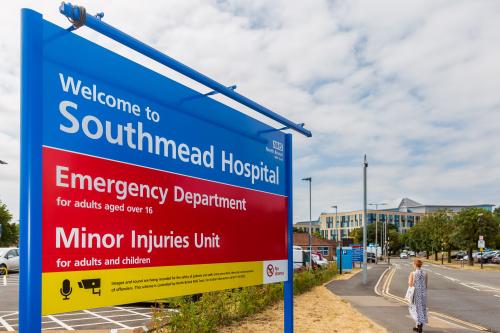
To support efforts to reduce rates of new HIV infections in Bristol, opt-out HIV testing is being planned to be introduced to North Bristol NHS Trust’s emergency department (ED).
In the future, people who need a blood test during a visit to Southmead Hospital's ED, will automatically be tested for HIV unless they specifically ask not to be. Opt-out testing will also be introduced for hepatitis B and C to help catch undiagnosed infections.
The scheme is being introduced in Bristol following the success of the scheme in A&Es in London, Brighton, Blackpool, and Manchester, which helped diagnose nearly 1,000 people with HIV over an 18-month period. The University of Bristol has been involved in the national evaluation of this scheme.
The programme aims to test people attending A&E departments who are having a blood test, regardless of whether they have symptoms. Opportunities to diagnose HIV in A&E give health professionals access to people who are less likely to engage with sexual health services, these include Black people, women and people aged 35 and over. The aim is to reduce undiagnosed HIV infections and get more people on treatment for HIV, in line with disease elimination goals.
Around 60 per cent of people in Bristol who are HIV positive are diagnosed late. If diagnosed and treated promptly, people can live normal and healthy lives with HIV. People living with HIV who are on treatment and have undetectable levels of HIV cannot pass HIV on through sex. The government recently announced £20 million of funding for this initiative which is expected to lead to a tripling of the number of HIV tests done in England next year and will help find some of the estimated 4,400* people living with undiagnosed HIV.
Councillor Ellie King, Cabinet Member with responsibility for Public Health and Communities at Bristol City Council, said: “I am over the moon that, after years of us lobbying the government, opt-out HIV testing is being expanded to A&E departments in Bristol.
“This couldn’t have happened without the hard work of the public health team at Bristol City Council, local health care providers and partners, the Mayor’s administration, and our Fast Track City partners Brigstowe and Terrence Higgins Trust.
“This roll out will be instrumental in catching HIV early, reaching groups of people who are often missed, and will save lives. Bristol has a One City goal to end new HIV transmissions by 2030 and this scheme will play a big part in helping us reach it.”
Jeremy Horwood, Professor of Social Sciences and Applied Health Research at the University of Bristol and co-director of Bristol Health Partners’ Sexual Health Improvement Programme Health Integration Team (SHIP HIT) added: “The SHIP HIT has been working hard to make the case for testing to be implemented in Bristol, where HIV prevalence is high. The evaluation shows that the initial phase has been extremely effective so it’s great to see the government acting on this evidence – it should make a real impact on rates of HIV diagnosis where it is urgently needed.”
Dr Mark Gompels, Consultant in Immunology and Clinical Lead for the HIV Service at Southmead Hospital, said: “We have been campaigning for this important change for a number of years and we’re excited that this new funding will enable us to help people stay well through earlier diagnosis of HIV and prevent transmission.
“1,400 patients attend for HIV care in Bristol and developments in HIV treatments mean these individuals can lead normal lives and do not transmit HIV to their sexual partners.”
“The number of new infections in Bristol has already reduced through early treatment and this funding will support us to meet the aims of our Fast Track City status.”
Dr. Megan Crofts, Consultant in Genitourinary Medicine and Clinical Lead for Unity Sexual Health, run by University Hospitals Bristol and Weston NHS Foundation Trust, said: “Knowing your HIV status is as important as checking your blood pressure.
“A positive HIV test gives members of our community the opportunity to access treatment before becoming unwell, to stay healthy and prevent them from passing on the virus. The opt-out HIV testing is vital in improving public and sexual health in Bristol, and we will now begin working to implement the service.
“If anyone wants to get tested, the easiest way to get a HIV test is by accessing free testing through the post from the Unity Sexual Health website or pick up a test from a Unity vending machine. Modern treatments mean that those who test positive for HIV can lead happy and healthy lives.”
